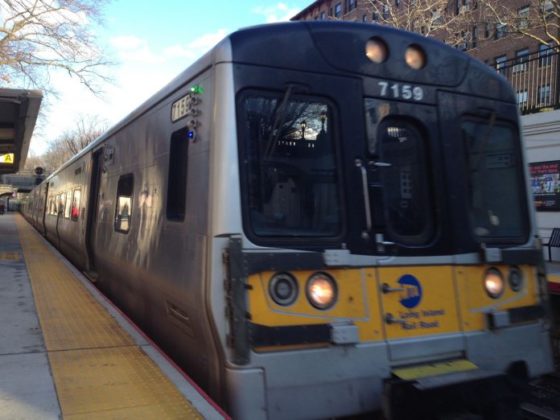With four of eight railroad crossings eliminated and six of seven bridges rebuilt or upgraded, a project placing a 10-mile third track between Floral Park and Hicksville on the Long Island Rail Road is “ahead of schedule” and “under budget” as the project reaches its halfway point, Metropolitan Transportation Authority leaders said in a statement last Thursday.
“This project continues to move forward at a remarkable pace and under budget, and is a model for how the MTA can deliver large infrastructure projects better, faster and cheaper,” Janno Lieber, the MTA construction president, said in a statement.
Lieber said that the MTA was proud of the work its teams are doing to maintain progress throughout the COVID-19 pandemic, which involves communicating and enforcing safe work practices, and conducting field inspections remotely by using Go-Pro cameras.
“In many cases, we’ve taken advantage of low ridership to actually accelerate work during the COVID crisis,” Lieber said.
While the MTA touts its safe work during the COVID-19 pandemic, New Hyde Park Trustee Rainer Burger said at an Oct. 1 meeting that the village had been receiving complaints from residents that overnight MTA workers were not following COVID-19 protocols.
The New Hyde Park Road grade crossing reopened on Aug. 24 after less than seven months of roadway work. The crossing was the third to be eliminated, following Urban Avenue and Covert Avenue.
The MTA also announced that the installation of elevators at the Floral Park LIRR station is nearing completion and the completion of Carle Place’s station is expected this winter.
Other work currently happening along the Main Line between Floral Park and Hicksville includes exterior renovations and other enhancement work at New Hyde Park’s LIRR station, finishing up the Harrison Avenue parking structure in Mineola, pile driving and preparation work for eliminating a grade crossing at Willis Avenue, and the excavation and construction of foundations for the enhancement and reconstruction of the Mineola train station.
Some of the ongoing work involves sound wall construction, installing sidewalks and landscaping and regular track inspection and maintenance, rail tie replacement, and preparatory work for future grade crossing eliminations along the right-of-way.
By the end of the project, eight grade crossings will be eliminated, seven bridges will be replaced or expanded, and five stations will be completely rebuilt along the 10 miles that the third track will be installed.
“This critical project has already delivered substantial improvements to our infrastructure that have translated into better service for our customers, and we’re excited for all that’s to come,” LIRR President Phil Eng said.
Projects like these will also help neighboring communities, foster economic growth, and ultimately help the region rebound and rebuild during the COVID-19 pandemic, Eng said.
MTA officials are also considering borrowing nearly $3 billion from the federal government in order to stay afloat due to the difficulties caused by the coronavirus pandemic.
The proposal was made by Lawrence Schwartz, chairman of the authority’s Finance Committee, during the agency’s Sept. 23 board meeting. The announcement came more than two weeks after a state audit conducted by the office of New York’s comptroller, Thomas DiNapoli, outlined the transportation authority’s grim future if federal aid was not provided.
Schwartz advised against the agency holding out hope for the federal government to come to an agreement on a second federal relief package in response to the coronavirus. The deadline for the government to submit another bailout package would be November, which is also when the agency is required to propose a budget for 2021.
“We cannot wait any longer for Washington to act, because the reality is they’re not going to act,” Schwartz said. “We have to be realistic. We need to be responsible.”
Schwartz proposed that the agency apply for a $2.9 billion loan with a 1.8 percent interest rate, which he said was the “cheapest money the MTA will ever be able to get as a loan.”
The agency has already received just under $4 billion in coronavirus relief aid from the federal government but said an additional $12 billion was needed to offset the loss of fares and tax revenues.
Agency Chairman Patrick Foye said he was open to the idea, but did not see the proposal as a long-term solution for “an agency that spends $300 million a week.”
Schwartz said the agency could return the money to the federal government if a bailout was implemented next year. The agency would have three years to repay the loan, according to officials.



